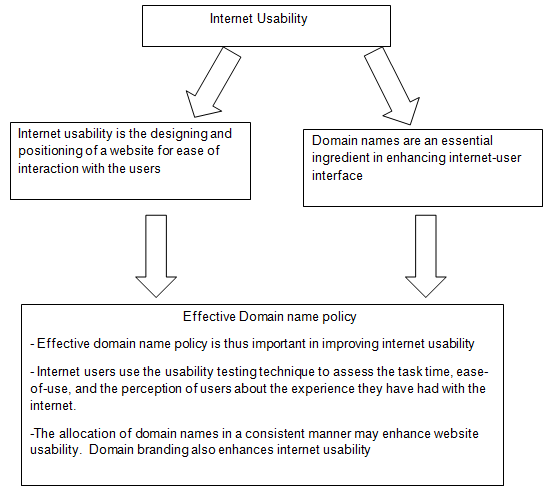Internet usability is a very important activity that helps to improve the internet-user interface mainly by utilizing domain names. Internet usability refers to the design and positioning of a website for ease of interaction with the users.
Internet usability entails such activities as web site design, human-computer interaction, Web site usability, online brands, and online marketing, among others (Bevan, Kirakowski & Maissel 1991). Domain names are an essential ingredient in the process of trying to enhance the internet- user interface. Effective domain name policy is thus important in improving internet usability.
The application of domain names is different from one country to another and this may result in contradictory domain name policies, thereby inconveniencing end users. There are enormous benefits associated with improved internet usability including higher customer satisfaction, higher sales, reduced support costs, and higher productivity.
Internet usability is also affected by the application of domain name policies. Available literature calls for the establishment of standards for use by domain name policy makers in their quest to enhance domain names usability. Modern day domain name policies differ markedly within a country and between countries.
As a result, these contradictory policies tend to inconvenience end users, in effect reducing the certainty of the domain name of a given entity. Nielsen (2003) opines that when users are examining how credible a given destination is, they often have to use domain names.
Consequently, the ability to predict these kinds of domain names is paramount. In a recent study conducted by Cutrell and Guan (2007), the researcher found out that users spent nearly a quarter of their time (25%) while online searching for various domain names on different search engines.
It is important to understand the concept of usability and how it can be tested. Usability refers to the interaction between a system and / or product with the user. Usability is an assessment of the potential of a product to fulfill the objective of the user.
Product usability can be determined by visual consistency, ease-of-use, as well as a coherent, spelt out process for evolution. Internet users use the usability testing technique to assess the task time, ease-of-use, and the perception of users about the experience they have had with the internet. A formal usability testing of the internet entails the use of a usability lab armed with video cameras.
On the other hand, usability testing can also be done informally, in which case paper mock-ups of either a web site on a given application are utilized. Various renowned web sites have enrolled the services of usability engineers who ensure that the site is friendly and easy-to-use, to give the customers a positive experience.
Some of the parameters that may be used to measure usability include satisfaction, acceptability, and performance (Bevan, Kirakowski, & Maissel, 1991). In addition, Nielsen (2003) argues that domain names are a very critical element of web user interface. Nielesen (2003) further opines that individuals will try and guess the different names of sites that they may have visited previously, or not.
The allocation of domain names in a consistent manner may enhance website usability. Some of the benefits associated with improved website usability include reliable domain name structures, enhanced usability for end users, as well as steadfast internet access through following of the established domain name allocation standards.
Domain branding enhances internet usability. Arnodl (2007) contends that there is scarcity of experimental studies on domain name branding. Separately, Haara and Nilsson (2000) are of the opinion that unforgettable domain names are crucial in helping to enhance online brands.
Similar sentiments have also been echoed by Nielsen (2003), who further argues that individuals will attempt to deduce the names of different domains for those sites that they may or may not have had an experience with before.
The usability and predictability of domain names is largely dependent on successful domain name policy. If at all we hope to overcome the challenges associated with poor domain name usability, there is the need to implement a policy evaluation framework for the domain name in question.
Conclusion
Internet usability refers to the design and positioning of a website for ease of interaction with the users. In order to improve internet usability, there is need to ensure effective domain name policy.
Some of the benefits associated with improved internet usability include higher sales, reduced support cost, enhanced customer satisfaction, and higher productivity. Website engineers use such parameters as satisfaction, acceptance, and performance to test internet usability. The branding of domain names also leads to enhanced internet usability.
Reference List
Arnold, B., 2007. auDA and dot-au statistics. Web.
Bevan, N., Kirakowski, J., & Maissel, J.,1991. What is Usability? Proceedings of the 4th International Conference on HCI. Stuttgart, Germany: Elsevier.
Cutrell, E., & Guan, Z., 2007. An eye-tracking study of information usage in Web search: Variations in target position and contextual snippet length. Conference on Human Factors in Computing Systems. San Jose, California, USA: Microsoft Research.
Haara, A., & Nilsson, G.., 2000. The Web Site as a Brand an Empirical Investigation of Four Online Companies. Web.
Nielsen, J., 2003. Usability 101: Introduction to Usability. Web.
Appendix – Graphic Organizer
